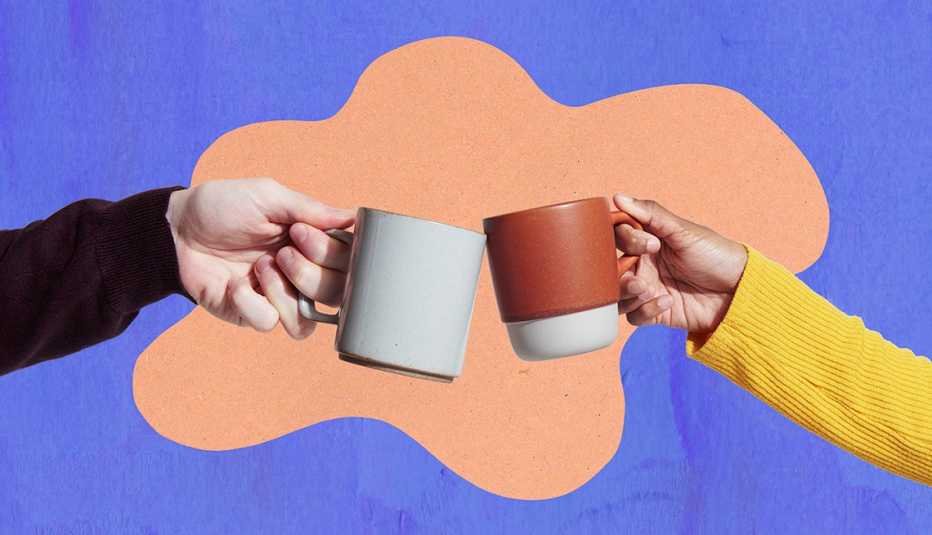AARP Hearing Center


Dry January — giving up alcohol for the first month of the year — is an excellent idea at any age.
Recent research confirms this. A review of several large studies, published in the September 2025 issue of the journal Alcohol and Alcoholism, shows that those who abstained for a month reported that they lost weight, felt happier and had a boost in concentration. They also reported lower blood pressure, less insulin resistance and better liver function.
“Dry January is a great opportunity to re-evaluate your relationship with alcohol,” Megan Strowger, a researcher at the University at Buffalo and a coauthor of the study, told Women’s Health magazine.
And older adults are drinking less these days. According to a Gallup poll from August 2025, the percentage of those 55 and older who imbibed fell from 61 percent in 2023 to 56 percent in 2025. That echoes overall drinking trends in the U.S., which in 2025 saw the percentage of adults who consumed alcohol fall to just 54 percent — the lowest figure ever in nearly 90 years of Gallup polling on the topic.
If you’re sober-curious and considering Dry January for yourself, our AARP Smart Guide can walk you through the process.
GETTING STARTED
1. Think about why you drink
If Dry January seems daunting, it may be time to consider recent lifestyle challenges that led to an increase in your drinking.
For example, “retirement brings special challenges, as one loses the social support of coworkers and the structure that a job provides,” says Dr. Joseph R. Volpicelli, executive director at the Institute of Addiction Medicine. “Free of the demands placed by a job, [retirees find that] alcohol drinking has one less constraint and can gradually increase.” Losing a loved one, especially a spouse, can also have “a profound effect on increased sadness and loneliness,” Volpicelli says.
2. Understand what ‘unhealthy drinking’ actually means
Unhealthy drinking is either drinking too much on a particular day (binge drinking) or having too many drinks over a week (heavy drinking), according to Volpicelli. The Centers for Disease Control and Prevention (CDC) says that adults 65 and older should limit their alcohol consumption to no more than one drink per day and seven drinks per week. While the risks are lower for adults who follow those guidelines, drinking later in life still poses “several increased health risks,” Volpicelli says, including high blood pressure, osteoporosis and cancer.
3. Audit your alcohol consumption
“We often underestimate our alcohol intake, and tracking it can provide a clearer picture of our habits,” psychologist Ryan C. Warner says. Write down your daily intake to create an honest assessment of how much you actually drink during an average week, and determine if you’re veering into dangerous territory. Or try a smartphone app, such as Sunnyside, DrinkControl, I Am Sober and Dry Days, that lets you track your daily drink totals, your dry days, the amount of money you’ve saved by not drinking and the calories you’ve avoided without the booze. Some apps, like Reframe, also offer online coaching sessions and support from an anonymous community of subscribers. An April 2024 study published in
eClinicalMedicine found that smartphone apps like Drink Less may help users reduce their drinking more than willpower alone. Some of the apps are free.
4. Be aware of ‘gray-area’ drinking
Gray-area drinking refers to drinking that “doesn’t meet the full clinical criteria for alcohol use disorder (AUD) but can still be problematic,” Warner says. This can be social drinking that occurs more than a few days a week, or regularly using alcohol to de-stress at the end of the day. “Even though it may not qualify as full-blown addiction, this type of drinking can still harm your health, relationships and daily life.”
5. Know your personal ‘why’
Keep whatever inspired you to try Dry January in mind as you tackle an alcohol-free month. “Recognize that this is something you are doing for yourself, primarily: a gift of improved physical and emotional health that’ll benefit you year-round,” says Edie Weinstein, a licensed social worker, psychotherapist and interfaith minister. “Don’t look at it as a New Year’s resolution. Consider it a lifestyle change and a shift in attitude about alcohol.” If or when you return to consuming alcohol, you’ll now know how you feel without it.
6. Track the benefits
How will you know if Dry January is benefiting your body? Journal about it, recommends Lisa Smith, author of Girl Walks Out of a Bar and cohost of the podcast Recovery Rocks. “Go gently with yourself and pay attention to how you feel without the alcohol,” Smith says. "Are you sleeping better?" Feeling less sluggish in the morning? Eating better? Have a clearer head?”
7. Don’t stress about tomorrow
As you make your way through 31 days without booze, try to focus on the current day, says Smith. “Don’t worry about how you’ll skip alcohol tomorrow or for the rest of the month. Remember that if you do drink, you can just pick right up and start again the next day. No need to be perfect!”
8. Understand, and avoid, triggers
When you begin Dry January, you may notice that certain thoughts, feelings, people, places or things make you crave alcohol. “Triggers include loneliness, boredom, stress and health issues,” explains Dr. Rehan Aziz, a geriatric psychiatrist and associate professor of psychiatry and neurology at Hackensack Meridian School of Medicine. “Retirement is a particularly challenging time. It can bring major changes in social roles and social networks, as well as changes to assets like income and health insurance. Any of these factors can cause loneliness and stress, which can lead to depression.”






































































You Might Also Like
Sip Smarter: The Advantages of Nonalcoholic Wine
Drinking comes with health risks. Here’s how to continue cheering without the hangover
How Can I Tame My Sweet Tooth?
A doctor’s advice on sugar and your health
Could This Mineral Be the Answer to Insomnia?
Magnesium is a potential remedy for sleepless nights
Recommended for You